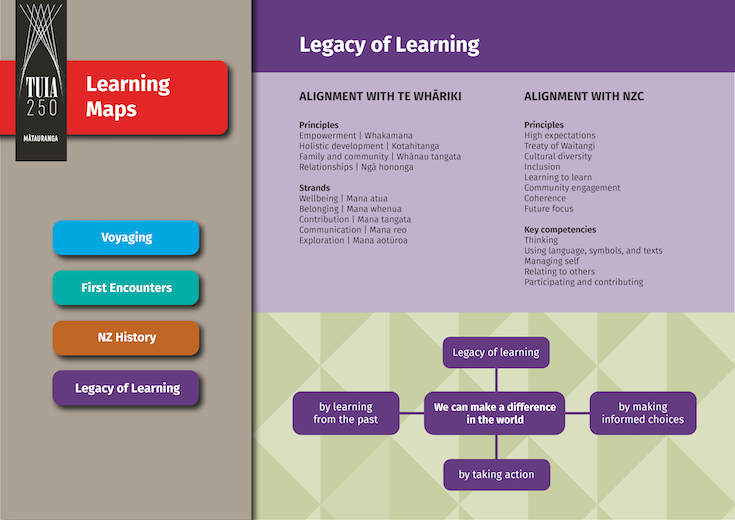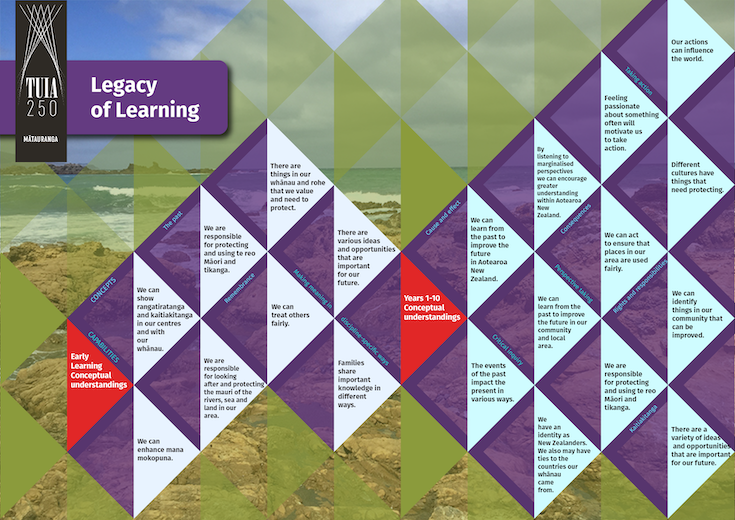Legacy of Learning
The Tuia Mātauranga themes are designed to be taught separately and are broad enough to be taught at any time. They support robust exploration of New Zealand's histories in local contexts and have value beyond the commemorations. Within this theme Legacy of Learning theme you will find:
Learning map | Conceptual understandings | Inquiry questions | Teaching and Learning Guide | Video
Learning map
Download a PDF version:
Legacy of Learning learning map.pdf 501 kB
Conceptual understandings
Download a PDF version:
Legacy of Learning conceptual understandings.pdf 309 kB
Inquiry questions
- How have the events of the past impacted on the present?
- What should we remember about the past to help improve the future in Aotearoa New Zealand?
- What should we remember about the past to help improve the future in our local area?
- What is our identity as New Zealanders? What are our ties to the countries our whānau came from?
- What do you think is unfair?
- When have you been treated unfairly?
- What cause would you consider protesting for?
- Is Aotearoa New Zealand fair for all groups? How can listening to marginalised perspectives help us make Aotearoa more fair?
- How can we ensure that places in our area are used fairly?
- How can we influence the world by what we do and buy?
- How we can protect and use te reo and tikanga?
- What are the things in your community that need to be protected?
- What are the things in your community that need to be changed?
- What ideas and opportunities are important for our future?
Download a PDF version:
Legacy of Learning Years 1-10 inquiry questions.pdf 122 kB
Teaching and Learning Guide
Download the Legacy of Learning Teaching and Learning Guide:
Tuia Mātauranga – Legacy of Learning Teaching and Learning Guide.pdf 1 MB
Video
We can make a difference in the world by learning from the past, making informed choices and taking action.
This Legacy of Learning video was recorded with students in year 3, year 6 and year 8. The material is not separated by age or stage - teachers are able to use it according to student interest and ability, and relevance to local communities.
In this video, students discuss the following inquiry questions:
- Did Captain Cook lay the foundation for current systematic injustices toward Māori?
- What might have happened if the first encounter with Māori had ended badly for Captain Cook?
- Do you think there was a difference in feeling between those iwi that did meet Cook and those that didn’t?
Note: You may prefer to tell the students the inquiry questions first, allowing them to formulate their own thoughts, before exposing them to the thoughts of others. Or, you may find that watching the video first prompts more discussion.
These videos are very useful for discussions of perspective, bias and values. Ask students to explore:
- Whose story is this?
- How can stories change over time?
- What can influence the way people talk about historical events?
- Is it more important that we know the events of history, or the consequences of those events?
- Do these events affect your lives and community today?
- What can we learn from history?
This video may prompt students to talk to their whānau, and the wider school community about the events portrayed, and the history they know. Students could then tell the historical stories of their own community in animation like this.
Text on screen
Recently, we asked a group of students from Aotearoa to talk about Tuia Legacy of Learning. These thoughts and perspectives are their own. Use this video to prompt discussion and explore your own perspectives and values.
Did Captain Cook lay the foundation for the current systemic injustices towards Māori?
Students’ voices
Because Captain Cook came here he brought different goods like he also brought white people. He brought different materials and tools and different ideas and how to live. And that really changed everybody's perspective.
It was good and bad, because he killed lots of people who didn't need to be killed. They weren’t supposed to be killed. It wasn't good. But then it's also good because we're here now and it's actually nice. It's getting better. We're treating everybody nicely now
Text on screen
You have heard what these learners think. How would you answer this question? Pause this video to explore your perspectives.
What might have happened if the first encounter with Māori had ended badly for Captain Cook?
Students’ voices
Well, it depends how early on he had been killed. Like, if it was quite early on, odds are nothing much would have changed for a long time. Things would have just stayed to the way that the Māori had it. It would have still affected them though, because if he did leave early on therem would still be the Māori killed. So it would still affect Māori but he would be dead so we wouldn't bring in, you know, different people into here.
But if he got killed later and the British already knew, they might have thought that they might have to conquer it. And they wouldn't have ended up in like even if the Treaty of Waitangi was bad, it doesn't mean, like it was better than just war.
If Captain Cook hadn't come here I would speak Maori fluently.
Text on screen
You have heard what these learners think. How would you answer this question? Pause this video to explore your perspectives.
Do you think there was a difference in feeling between those iwi that did meet Cook and those that didn't?
Students’ voices
Maybe they felt like why didn't we get these special gifts that came from the white people. Or maybe, they might have felt jealous, they might have thought that at least we're lucky enough that none of us got killed.
End titles
Download a PDF version:
Tuia Mātauranga – Legacy of Learning.pdf 74 kB
Explore other Tuia themes
- First Encounters – the meeting of land and sea, Māori and Aotearoa, Māori and European and the many migrations.
- Voyaging – the 1000 years of Pacific voyaging and celestial navigation, and the meeting of two great voyaging traditions.
- New Zealand History – the significant people, places, and events that shaped the community, and those of significance to all New Zealanders.



